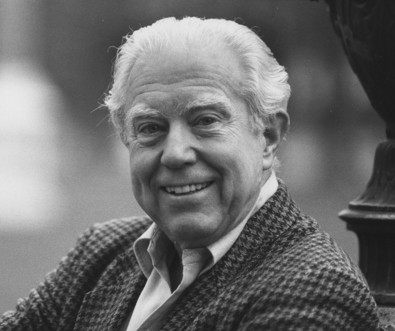Tuesday we listened to two great original works for brass choir: Malcolm Arnold's Symphony for Brass and Henri Tomasi's Fanfares Liturgiques.
 |
| Sir Malcolm Arnold |
The recording of Sir Malcom Arnold's Symphony for Brass was done by the Philip Jones Brass Ensemble.
The piece was written in 1978 with the PJBE standard instrumentation of
four trumpets, one horn, four trombones and one tuba.
Arnold was born in Northampton, England in 1921 and after hearing Louis
Armstrong play, he decided to learn the trumpet at age twelve. He
attended the Royal College of Music and studied trumpet with Gordon
Jacob. In 1957, Arnold won an Academy Award for the music to epic film The Bridge on the River Kwai. According to Music Academy Online:
Malcolm Arnold moved to Ireland in 1972, where he reveled in the lush scenery and lively Celtic music. Here, however, his behavior became increasingly erratic and, in 1977,
his second marriage collapsed and he returned to England, exhausted and
unable to work for several years. Significant works eventually emerged
during this unhappy period, such as the Trumpet Concerto, Symphony for
Brass and the Eighth Symphony.
Oral history of Glyndebourne opera
Oral history of Glyndebourne opera
For more information about the PJBE, here is a link to the book The Odyssey of the Philip Jones Brass Ensemble by Donna McDonald available at Editions BIM.
 |
| Henri Tomasi |
The recording of Fanfares Liturgique,
by Henri Tomasi, was made by Grand Ensemble de Cuivres et Percussion des Hauts de France, with Alexis Malotchkine & Bernard Calmel. As you heard, it is a very powerful and well-crafted
composition. The names of the movements are translated below, and as we
discussed, the genre seems to be an "instrumental oratorio" - that is, a
sacred brass choir version of a liturgical work. Of course there is no
text sung, but the orator could be represented by the trombone solo of
the second movement. Note also the return of the triumphant first theme,
possibly a motif for the Christ figure, returns in the final movement. I
also was reminded in several passages of the works Stravinsky,
Respighi, Bach, and Dukas.
This work was originally called "Fanfares Concertantes" and was part of his opera Don Juan de Mañera.
Movements:
- I. Annonciation (Annunciation is the term describing the moment when the angel Gabriel declared Mary to be the mother of God)
- II. Evangile (Gospel, or the word of God)
- III. Apocalypse (Apocolypse, or revelation?) Four Horsemen who are listed as Pestilence (disease epidemic), War, Famine, Death
- IV. Procession du Vendredi-Saint (Good Friday Procession, a Christian celebration commemorating the crucifixion of Jesus)
For more information about Tomasi, go to the Tomasi page and for more listening, go to Tomasi on Naxos.


